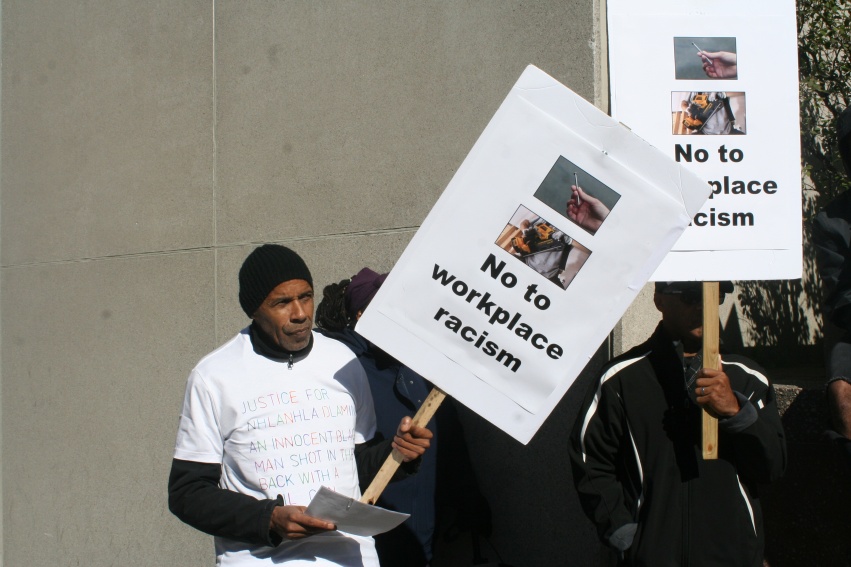
KJIPUKTUK (Halifax) – Culture, race, heritage and ethnicity all play a role in one’s mental health and well being. Taking this into account can make all the difference in the healing process and reduce the isolation of many.
Based on prolonged exposure to the effects of racism and poverty many if not all African Nova Scotians suffer from symptoms of post-traumatic stress disorder. This is part and parcel of the mental experiences of many in the African Nova Scotia community.
Throughout the history of the African Nova Scotian community many families have tried to cope with the mental stresses by embracing family intervention methods such as dialogue, support, love, and community supports in trying to produce positive change.
These efforts put forth by families and communities are to be recognized and appreciated.
From the sixties on down many labels have been placed on African Nova Scotians who exhibited differing behaviours. These labels include retarded, learning disabled, crazy, animalistic, etc.
One could venture to say most psychologists and psychiatrists in the province of Nova Scotia have little or no understanding of the lives, culture, heritage, lineage, and traditions of African Nova Scotians. It is therefore very difficult to see yourself in the picture or to benefit even if one has access to professional supports.
Psychologists and others play an essential role in helping people modify their behaviour to prevent and recover from chronic mental and physical illnesses.
These roles are limited when there is little or no understanding of the African Nova Scotian experience.
African Nova Scotians are just as much candidates for mental illness as anybody, yet they have limited access and receive substantially less treatment than others.
Based on the maintenance of poverty, African Nova Scotians in neighbourhoods of poverty have limited access to mental health services that reflect their culture and ethnicity, interests and their experience.
Although mental health professionals in the province of Nova Scotia have extensive training, they lack culturally appropriate training.
There needs to be increase funding for mental health services that includes culturally sensitive programming and services. Regulatory bodies that are responsible for the administration of mental health services in Nova Scotia must have training programs with an emphasis on cultural understanding and sensitivity.
Culturally sensitive training programs for psychologists, psychiatrists, therapists and counsellors can help reduce stigma and reduce much of the suspicion that many African Nova Scotians have of mental health professionals and the mental health system of programs and services in Nova Scotia.
Equally, such programs will increase awareness and provide culturally competent services that promote inclusion
The need for African Nova Scotian mental health programs and services are overlooked. There is a major gap in services to address the needs of African Nova Scotians and the province as a whole is lacking the culturally sensitive mental health care that would benefit African Nova Scotians. As well funding should be made available for Afrocentric mental health counselling.
As far as I am aware there are fewer than 14 African Nova Scotian mental health counsellors, including myself
As previously mentioned, many African Nova Scotians are suspicious of the mental health system because they do not see themselves in the picture.
It is fair to say that many African Nova Scotians would like to see heritage based and culturally sensitive mental health programs and services
Personally, I suffer from anxiety and the mental health professionals I visited had no clue or understanding about my culture, heritage, customs traditions or the impact that racism has had on my mental well-being.
Many African Nova Scotian seniors suffer high levels of mental distress based on the power and control of racism.
Provincial mental health programs and services currently do not meet or address the diverse needs of African Nova Scotians.
The African Nova Scotian community requires strategies in the coordination of programs and services in order to effectively address the mental health concerns of African Nova Scotians.
An example of this is that the African Nova Scotian community embraces Afrocentric mental health services, but has never received funding for such because of a lack of collective drive and political will in that direction.
The plan to improve mental health services in Nova Scotia might be praiseworthy if it included services for African Nova Scotians and First Nations people.
There must be a concerted effort put forth to affect the action needed on Afrocentric Mental Health Services.
African Nova Scotians suffer in silence, not being privy to programs and services they can identify with. With differences in heritage, culture and lineage, the time is past due for services and programs that accommodate the unique differences of African Nova Scotians.
Many organizations could be vehicles for the above-mentioned necessary change, especially if they’re non-profit, if only they had the necessary funding in place.
There has to be strong advocacy for the establishment and implementation of Afrocentric mental health services in Nova Scotia.
The key objectives of Afrocentric mental health Services in Nova Scotia are:
- Community based mental health programs and services close to home;
- Involvement of the African Nova Scotian community in the process;
- Afrocentric programs and services with the majority input by African Nova Scotians with set up, monitoring and administration;
- To develop a timely response mechanism (strategy) to deal with youth in crisis in our communities…. etc.
Oppression equals depression.
See also: Guyleigh Johnson – Black people don’t get depressed
With a special thanks to our generous donors who make publication of the Nova Scotia Advocate possible.
Subscribe to the Nova Scotia Advocate weekly digest and never miss an article again.




How can someone find the list of African Nova Scotian mental health professionals?